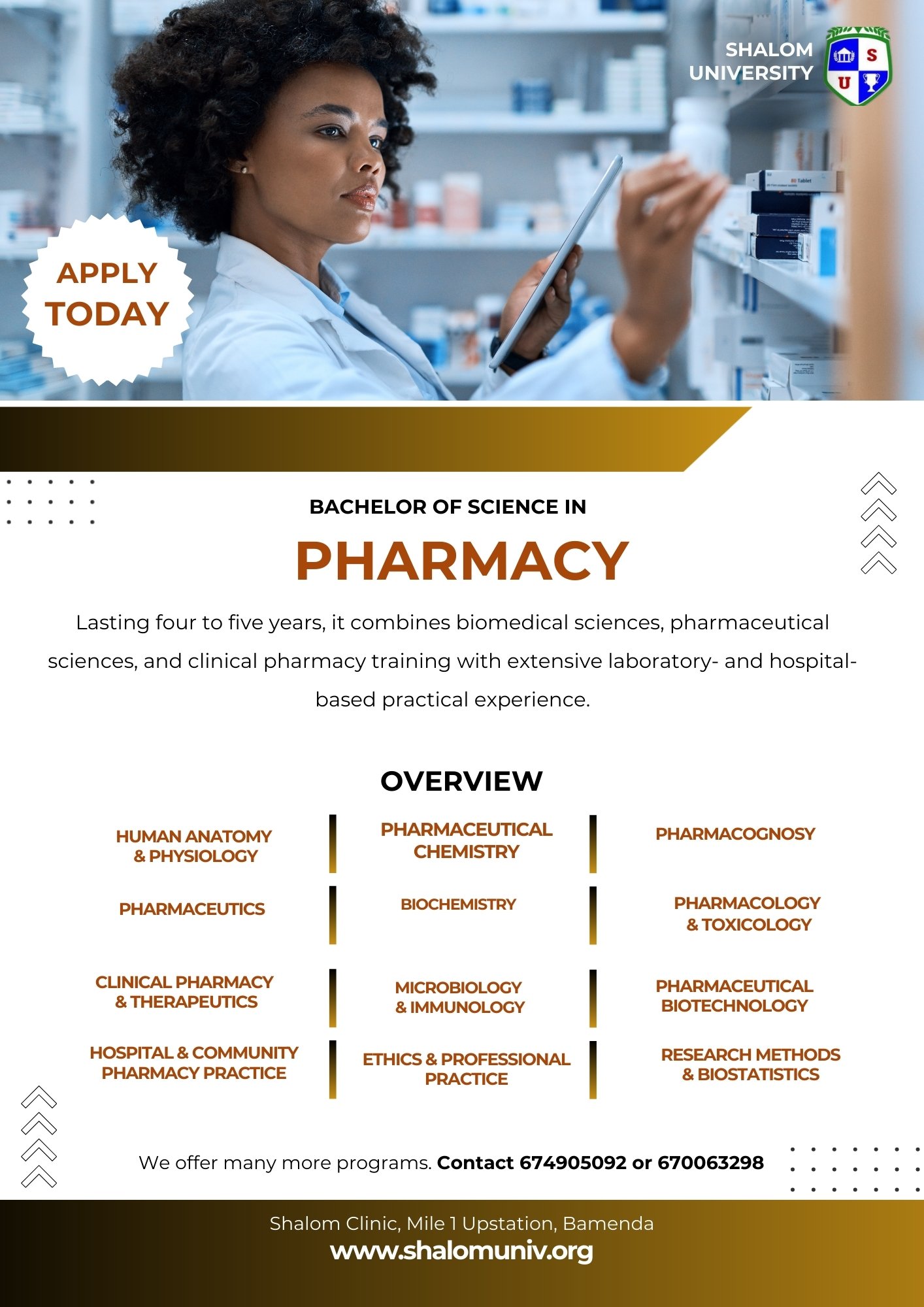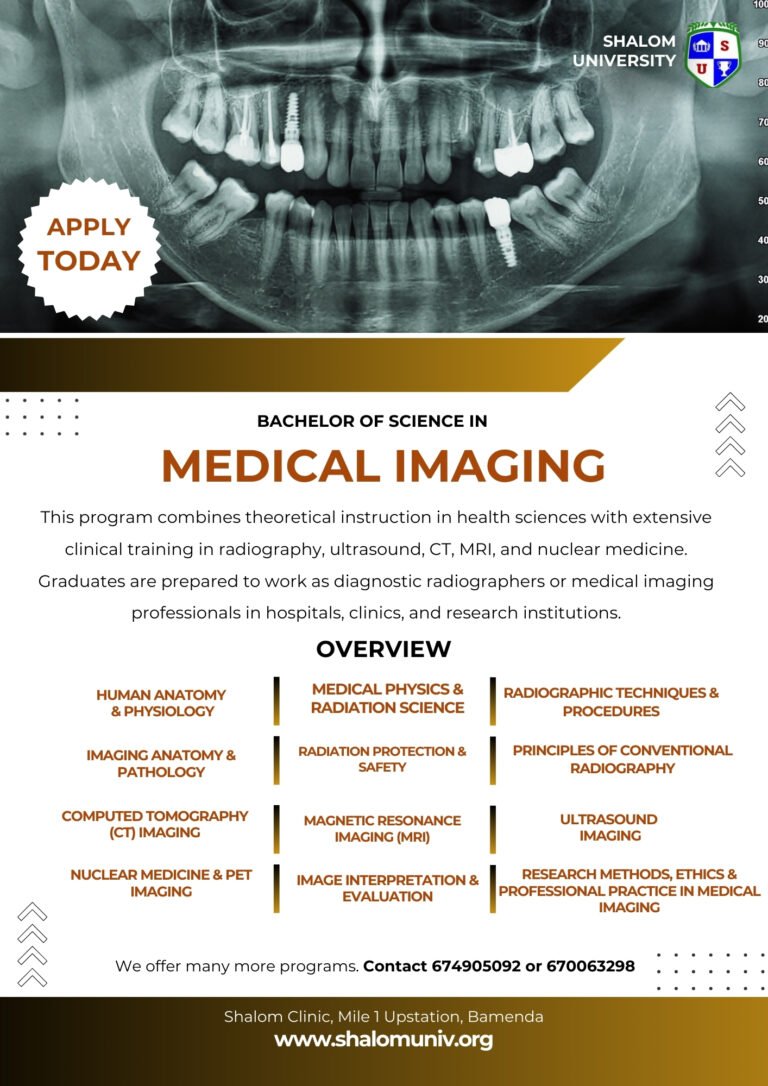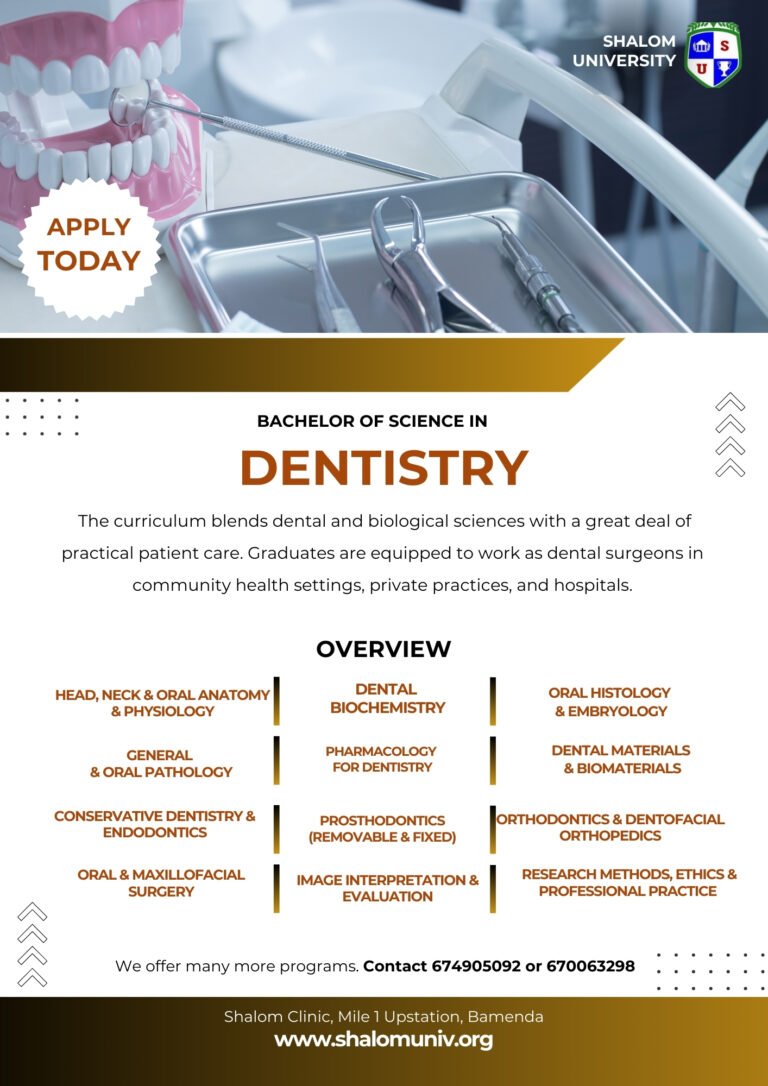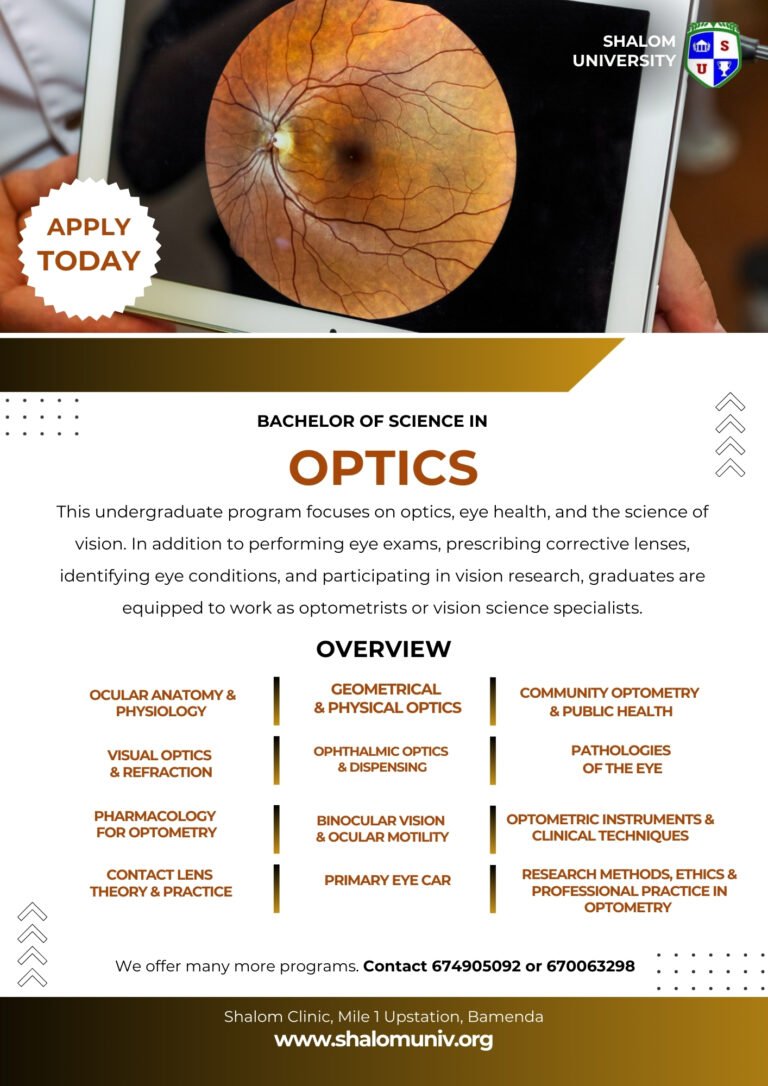Pharmacy is a vital healthcare profession that bridges science, medicine, and patient care. Pharmacists play an essential role in ensuring safe and effective use of medications, advancing pharmaceutical research, and promoting public health.
The Bachelor of Pharmacy (BPharm) program at Shalom University is designed to equip students with in-depth knowledge in pharmaceutical sciences, clinical practice, and research. Graduates are prepared to work in hospitals, community pharmacies, pharmaceutical industries, and regulatory agencies, contributing to better healthcare outcomes both locally and globally.
This article provides a detailed overview of the core courses and practical training offered in Shalom University’s BPharm program.
Human Anatomy & Physiology
A strong understanding of human anatomy and physiology is the foundation for pharmacy. Students learn how the body functions, including organ systems, metabolic processes, and physiological mechanisms, enabling them to understand drug actions and therapeutic effects.
Pharmaceutical Chemistry
Pharmaceutical chemistry focuses on the design, synthesis, and analysis of drugs. Students study organic, inorganic, and medicinal chemistry to develop a strong foundation for drug formulation, quality control, and therapeutic efficacy.
Pharmacognosy (Study of Medicinal Plants)
Pharmacognosy explores medicinal plants, natural products, and their therapeutic uses. Students learn to identify, extract, and standardize bioactive compounds, bridging traditional medicine with modern pharmaceutical applications.
Pharmaceutics (Drug Formulation & Delivery Systems)
Pharmaceutics covers the preparation, formulation, and delivery of drugs in forms such as tablets, capsules, injections, and topical applications. This course trains students to design effective and patient-friendly pharmaceutical products.
Biochemistry for Pharmacy
Biochemistry provides insight into molecular and cellular processes relevant to drug action. Topics include enzyme function, metabolism, nucleic acids, and molecular mechanisms of disease, forming the basis for pharmacological intervention.
Pharmacology & Toxicology
Pharmacology studies the mechanisms of drug action, therapeutic uses, and side effects. Toxicology complements this by analyzing adverse drug reactions, poisonings, and safety assessments, enabling pharmacists to manage medications safely.
Clinical Pharmacy & Therapeutics
This course bridges pharmacy with patient care. Students learn to evaluate prescriptions, optimize drug therapy, monitor treatment outcomes, and counsel patients, ensuring safe and effective medication use in clinical settings.
Microbiology & Immunology for Pharmacy
Understanding infectious agents and the immune system is essential for pharmacists. Students study bacterial, viral, and fungal pathogens, immune responses, and antimicrobial therapy, preparing them for roles in infection management and vaccine-related pharmacy practice.
Pharmaceutical Biotechnology
Biotechnology in pharmacy focuses on biopharmaceuticals, recombinant DNA technology, vaccines, and gene therapy. Students learn to develop and evaluate biotechnological drugs, a growing field in modern medicine.
Hospital & Community Pharmacy Practice
This module emphasizes practical experience in hospital and community pharmacies, including dispensing, drug inventory management, patient counseling, and interprofessional collaboration. Clinical rotations ensure graduates are job-ready from day one.
Pharmacy Law, Ethics & Professional Practice
Pharmacists must adhere to legal, ethical, and professional standards. Students study pharmacy laws, regulatory compliance, ethical dilemmas, and professional conduct to ensure responsible practice.
Research Methods & Biostatistics in Pharmacy
Research is central to pharmaceutical innovation. Students gain training in experimental design, data analysis, statistical methods, and reporting results, preparing them for careers in research, quality control, and academia.
Career Opportunities for BPharm Graduates
Graduates of Shalom University’s BPharm program are prepared for careers as:
- Hospital pharmacists managing drug therapy and patient care.
- Community pharmacists providing dispensing services and health education.
- Pharmaceutical industry professionals in drug development, quality control, and regulatory affairs.
- Researchers in pharmacology, medicinal chemistry, or biotechnology.
- Public health and policy advisors improving medication safety and access.
The degree also provides a solid foundation for postgraduate studies such as MSc or PharmD, specializing in clinical pharmacy, pharmacology, or pharmaceutical research.
Why Choose Shalom University for Pharmacy?
- State-of-the-art laboratories and pharmaceutical research facilities.
- Integrated curriculum blending theory, clinical practice, and research.
- Experienced faculty with clinical and research expertise.
- Community engagement through outreach programs and health campaigns.
- Global relevance, ensuring graduates meet international pharmacy standards.
For more information, visit the official BPharm program page.
Frequently Asked Questions (FAQ)
Q1: How long is the Bachelor of Pharmacy program at Shalom University?
A: The BPharm program typically lasts four years of full-time study, including practical rotations and research projects.
Q2: What are the entry requirements for BPharm?
A: Applicants should have a strong science background in biology, chemistry, and physics at the secondary school level. International students may have additional requirements.
Q3: Does the program include practical training?
A: Yes, students participate in clinical rotations and hands-on laboratory work, gaining real-world experience in hospital and community pharmacy settings.
Q4: What career opportunities are available for graduates?
A: Graduates can work in hospitals, community pharmacies, pharmaceutical industries, research laboratories, and public health organizations.
Q5: Why choose Shalom University for pharmacy studies?
A: Shalom University provides modern facilities, research-driven learning, community engagement, and experienced faculty, preparing graduates for successful careers in pharmacy.




